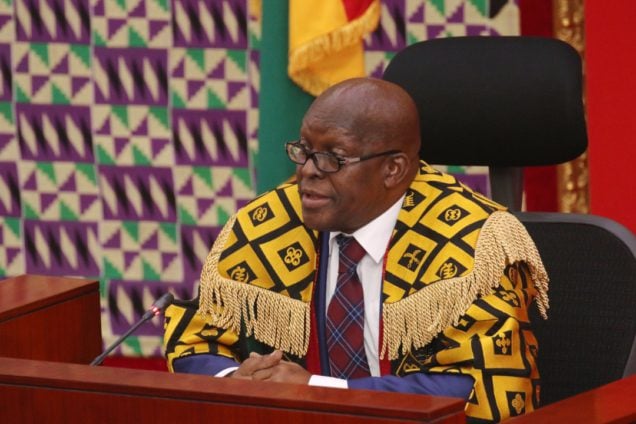The New Patriotic Party (NPP) branch in Germany has issued a scathing critique of the Speaker of Parliament, Alban Bagbin, targeting his recent conduct and leadership style. In a press release dated November 6, 2024, the group expressed grave concerns over what they perceive as Bagbin’s hypocritical compliance with a Supreme Court ruling that resulted in the removal of four parliamentarians. They argue that this compliance raises serious questions about his integrity as a leader and his genuine commitment to democratic values. The NPP Germany suggested that Bagbin’s decision to reconvene Parliament is more reflective of political maneuvering than a sincere intention to advance national interests, further asserting that his actions have often contradicted his public declarations about his role as a leader.
The NPP Germany went on to characterize Bagbin’s leadership as inconsistent and laden with political bias, claiming that rather than substantively addressing the welfare of the Ghanaian populace, he has leaned towards advancing the agenda of the opposition National Democratic Congress (NDC). Within their critique, they highlighted specific instances where they believe Bagbin’s focus has strayed from national issues to political gain, indicating that his approach has resulted in a Parliament defined by unnecessary conflict and political point-scoring. This claim underscores a broader dissatisfaction with how Bagbin has managed parliamentary sessions, which, according to the NPP Germany, should prioritize the collective concerns of Ghanaians.
In the context of these criticisms, the NPP Germany’s press release signaled a moment of reckoning for Bagbin, suggesting that his decision to reconvene Parliament is emblematic of deeper issues regarding his leadership. The reconvening, set for November 7, 2024, raises pivotal questions about Bagbin’s motivations; observers are left to ponder whether his actions represent a commitment to parliamentary integrity or a recurrent instance of political hypocrisy. The group contends that his past rhetoric, which professes to prioritize the interests of Ghanaians, is increasingly undermined by actions that appear politically charged and self-serving.
Throughout his tenure, Speaker Bagbin has positioned himself as a proponent of democratic ideals and the shepherd of parliamentary processes. However, critics, including NPP Germany, argue that there exists a notable dissonance between Bagbin’s professed commitments and his conduct as Speaker. They argue that despite claims of upholding democratic values, his leadership has often paved the way for increased tensions within Parliament, obstructing constructive debates and fostering a culture of confrontational politics rather than cooperative governance. This detail accentuates their perception of Bagbin’s leadership as being underpinned by a political loyalty to the NDC rather than a steadfast allegiance to the democratic framework of Ghana’s governance.
The backdrop of tension and factionalism presents a complex landscape in which Bagbin operates, making his position all the more contentious. The NPP Germany’s assertiveness in addressing these affairs indicates a broader discontent within segments of Ghana’s political discourse, as parties scrutinize one another’s adherence to democratic norms and the effective functioning of Parliament. The ramifications of Bagbin’s leadership style, as articulated by NPP Germany, may reverberate beyond the immediate political landscape, potentially influencing public perception and the credibility of parliamentary institutions in Ghana.
In summary, the critique from NPP Germany highlights a growing concern regarding Alban Bagbin’s suitability as Speaker of Parliament. Their claims spotlight a troubling dichotomy between his public statements about democracy and the realities of his leadership style, which they assert leans towards partisan interests over collective political integrity. As Parliament reconvenes, the eyes of both supporters and detractors will remain fixated on Bagbin, his actions, and how they reflect the broader health of Ghana’s governance. The coming sessions will either reaffirm or further undermine his position, all while shaping the narrative around the functionality and integrity of Ghana’s parliamentary process as a whole.














